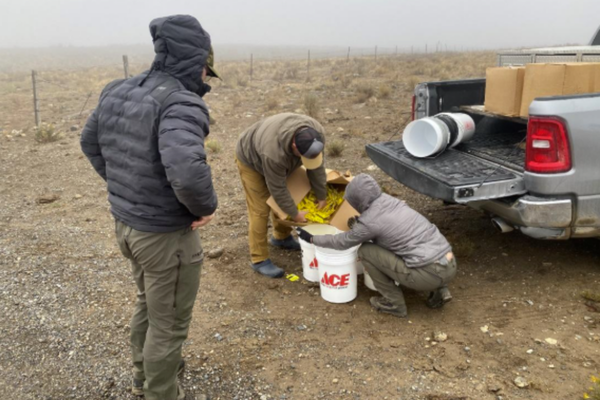HB 658 Moves to Full Senate Vote With Amendments
We were told sportsmen Amendments were considered, but “consideration” is not “application”.
On Tuesday, March 20, HB 658 got some changes approved by the Senate. The Amendments struck pages 3 – 21 from the original HB 658, and replaced those 19 pages with similar language. It will be voted on by the Senate Wednesday, March 21st. If approved the new bill will head back to the House Committee, where public testimony will not be allowed, unfortunately. Once again, the bill will likely avoid a hearing before the Judiciary and Rules Committee where criminal laws are reviewed by legislators with legal experience.
We do appreciate the willingness of the Senate to consider amendments and address sportsmen’s concerns, where the House would not. However, IWF and other sportsmen groups submitted a number of Amendments to make the bill palatable to sportsmen, which were largely rejected. Some of our proposed Amendments were used but the language was changed, watered down, severely weakening our intent. This new Amended bill will not be supported by IWF.
Vigilant sportsmen engagement has changed HB 658 drastically from the original HB 536. For example, “permission” has been redefined from “written permission” on specific highly detailed forms to include “or another form of permission or invitation recognized by law.” Also, the first offense, in some instances, is now deemed to be an infraction instead of a misdemeanor. We thank the Senate for these tweaks. But even retooled, the creators of HB 658 and its Amendments didn’t just leave many sportsman concerns in the dust. Proposed changes by law enforcement associations like the Idaho Sheriffs and the Police Chiefs, even a few Mayors, went unanswered. But as the people who will make the arrests and prosecute these new offenses, what do they know…
What sportsmen-proposed Amendments were left out?
Equitable recovery of legal costs. The one way fee shifting language was in HB 536 and HB 658, and allows only a landowner to recover legal and other investigative fees in a trespass suit, while a recreationist gets nothing if proven innocent. The Amended HB 658 adds language so the innocent may recover legal fees only if he/she can prove the case has “no foundation”. So, a high burden is still put upon the innocent to prove accusations were unfounded, meaning the provision is still not equitable. Why should Sportsmen be treated like second class citizens? Truly equitable language would read like our proposed amendment: “the prevailing party shall be entitled to recover attorney’s fees.” Our Amendment was added in a watered down form, but didn’t add the true strength of equity.
Stream Access provision. Idaho has some of the best stream access laws in the country, providing the freedom for anglers, boaters, and floaters to pursue fish as long as they stay below the ordinary high water mark. However, in existing code, the public is allowed to wade or portage outside the high water mark onto private property to avoid obstacles in the waterway, like a fence. We proposed an amendment to reinforce this right so folks avoiding a hazard wouldn’t be subject to a lawsuit. Without this provision, there will be significant grey area in this code section. So, if you are sued for trespass in this situation, it is highly unlikely you will get your legal defense covered if you’re proven innocent because the landowner’s lawsuit could be wrong, but not “without foundation”.
Retrieving downed game animals. Often times birds and big-game shot on public land are wounded, cross boundary lines, and expire beyond reach. Without permission to cross property lines the animal can waste or a hunter will trespass for retrieval- a Catch-22. Many states have provisions where hunters may retrieve animal on private grounds to prevent waste. Some states require a firearm be left behind, while others consider a firearm might be necessary to dispatch an animal. Under all versions of the bill, property lines have been blurred due to relaxed posting requirements, so we expressed concerns about retrieving game. We thought it was worth a shot. The Amendment was rejected.
Civil remedy for posting public lands as private. One thing IWF heard over and over again throughout the session was “if landowners get stiffer penalties for trespass, then there should be stiffer penalties for claiming public land as private”. We agree. Marking public land as private is happening all the time, sometimes by landowners (or their armed guards), and sometimes by other hunters. Either way, people are getting away with it because the punishment for getting caught is next to nothing. Our amendment would’ve allowed public land users to take legal matters into their own hands regarding illegal posting, to challenge their peers in court instead of relying on enforcement agencies. In a clear pronouncement of where our legislature takes its orders from, our proposed amendment was shot down. Similarly, we drafted our own bill to address this issue, got a routing slip (a formal Bill) from Senator Heider (R, Twin Falls), and yet we could not get a hearing for our bill. Notice a trend?
Eliminate a provision defining private Property as ” any land that can be reasonably associated with a residence or place of business”. This language is vague and forces any public lands user to associate things that might represent commerce to mean the surrounding land is private. Think cows. Cows are found all over public lands. Does a cow in the middle of a forest mean that land is a ranching business? Most often no. It will on a farm where pastures are obvious and usually accompanied by infrastructure. Does a logging operation suggest private land? Also, no. How close can a hunter get to either of these examples before they cross this imaginary line? Our Amendment simply defined the lands more closely associated with residences or business so recreationists aren’t scared off public lands for fear of a lawsuit they can’t afford to win. And, you guessed right…it was rejected.
Corner-crossing Amendment. Hundreds of thousands of acres in Idaho are locked up in checkerboard patterns interspersed with private lands. Just look at the hundreds of tiny 40 acre parcels of intermixed state land outside St. Anthony. It looks like someone sprinkled salt and pepper together. In these scenarios you can stand in the corner of a public land parcel and reach into the opposite corner of another public land parcel. But, in doing so, you may be ever so slightly trespassing simultaneously on two plots of private land even without malicious intent. Unfortunately, these public hunting grounds are literally in reach, but legally out of reach. Even though you pay taxes for those lands, only the people owning land adjacent to them might be deemed to have exclusive access. We tried to remedy that. The Amendment failed.
There’s still a chance to send this bill back to the drawing board. IWF would like to convene an interim committee to study this issue further as well as to address concerns such as those in the amendments discussed above. Like many who testified in favor of all versions of this bill, we agree that adding teeth and consistency to Idaho’s trespassing laws is something worth working on. However, rushing through a one sided complex bill like this will have unintended consequences. A polite call to the Governor (208- 334-2100) would also convey the message that sportsmen are concerned.




